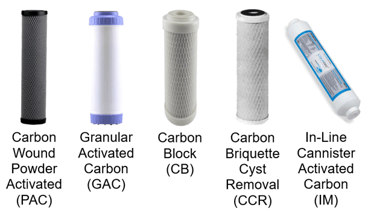Do you have water filters to remove Sulfur?
Yes, we have carbon filter cartridges which can remove LOW concentrations of sulfates through the adsorption process. These carbon filters are designed for reducing odor and improving taste. Carbon filters are typically installed for POU (Point of Use) to treat drinking and cooking water. Activated carbon filters have the tendency to absorb hydrogen sulfide present in the water but have a limited capacity for major odor absorption.

These carbon taste and odor cartridges are not effective at removing sulfur in a significant concentration. To effectively remove Sulfur for a whole house application, one should start by having their water tested by a reputable water treatment company to determine exactly what is in the water and at what concentration. You cannot properly select what type of filtration or water treatment equipment is needed if you do not know what is in your water.
We are not qualified to make a recommendation on which process or type of water treatment equipment is best suited for your water condition. There are various ways to remove sulfur including:
- Use of chlorination
- Using the Greensand filter (Manganese Zeolite)
- Using water filtration and purification systems
- Use of Aeration system
- Use of metal chelators
There are some easy steps a homeowner can do to determine the source of the smell.
The first thing is to check for water smells in both the cold and hot water faucets, if the odor is from the hot water only, or if it is also coming from the cold well water. If there is an odor in the hot water that is not apparent in the cold water this indicates a problem with the water heater. If there is only an odor in the hot water, sulfates in water, as well as iron and sulfur bacteria, can interact with the anode rod in the water heater creating hydrogen sulfide gas which is the rotten egg smell in water. Changing the anode rod to an aluminum rod can often solve this problem of having well water that smells like sulfur. If this is not convenient, periodically adding hydrogen peroxide to the water heater, which kills the odor instantly and is safe to use. One must flow recommended procedures provided by a water treatment professional.
The second thing to do if the smell is also apparent in the cold water, is to run a hose bib or tap as close to the water well as possible and fill a 5-gallon bucket or other container and notice if there are odors.
- If you smell a “rotten egg” odor, this is hydrogen sulfide gas.
- If the water smells like oil or asphalt this can be from manganese.
- If your water smells like cucumber or sewage this is usually a result of iron or sulfur bacteria.
Having the information from conducting these basic tests will allow you to have better conversations with your water treatment company.
